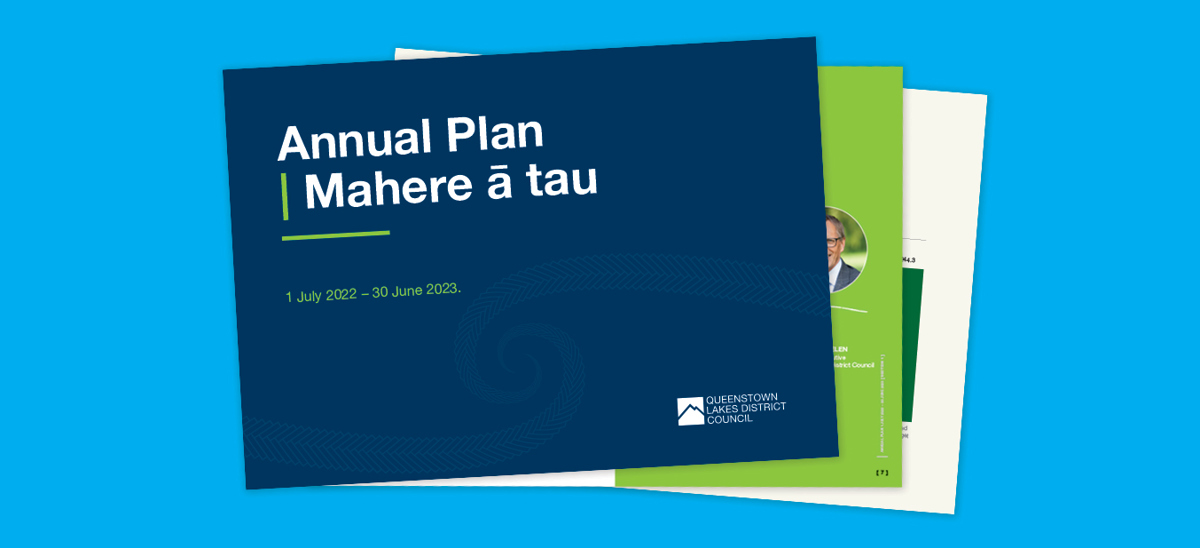-
Services
-
expand_more
Back
Services
-
-
expand_more
Back
Rates & Property
- Setting the Rates
- New Wastewater Rates for Cardrona
- Revaluation and how it affects rates
- Rates Dates & Payment Options
- Changing your details
- Property Information Search
- Online Rates Payments
- Rates Rebates, Remission & Postponement
- Short-Term Visitor Accommodation
- Other Information
- Rates FAQs
-
-
expand_more
Back
Rubbish & Recycling
- How we recycle in the Queenstown Lakes District
- Cut your waste
- Commercial Services
- Rubbish & Recycling Collection
- Recycling Centres
- Transfer Stations
- Solid Waste Assessment
- Waste Minimisation Community Fund
- Waste Minimisation for Businesses
- Zero Waste Events
- Other Waste
- A-Z Directory Feedback
-
-
expand_more
Back
Resource Consents
- Application forms and fees
- Current resource consents
- Development contributions
- Duty Planner
- eDocs
- Engineering acceptance
- Exemptions
- FAQs
- Find your zone using GIS
- How to use the District Plan to know the rules
- Land developments and subdivisions
- National Policy Statements and National Environmental Standards
- Notified resource consents
- Practice notes and guidance
- Pre-application meetings
- Resource consent process
-
-
expand_more
Back
Alcohol Licensing
- Alcohol Public Notices
- Find the right alcohol licence and apply
- Rugby World Cup Information
- Alcohol licence fee calculator
- Renew and/or vary your alcohol licence
- Manager's certificates
- Legal requirements for licence holders
- District Licensing Committee decisions
- ARLA annual report
- Alcohol-Free Areas In Public Places
- Have your say on alcohol licence applications
- All alcohol licensing forms
-
-
Do It Online
-
expand_more
Back
Do It Online
-
-
expand_more
Back
Registrations
- Register your Dog
- Register for a transfer or refund of dog registration fee
- Renewal for Hairdressers, Campgrounds, and Offensive Trade Registrations
- Activities in a Public Place - Application Form
- Register as a Homestay
- Register as Residential Visitor Accommodation
- Register for our public notification list
- Register to speak at Public Forum
- Register for Kerbside Collection Services
- No Spray Register
-
Community
Community
Ngā Hapori
- Summerdaze
- Manaaki
- Community Connect
- Welcoming Communities
- Arts, Culture and Heritage
- Citizenship Ceremonies
- Community Associations and Groups
- Community Funding
- Community Research
- Community Wellbeing
- Economic Development
- Emergency Management
- Energy Saving Tips
- Event Planning and Venues
- Māori Community
- Managing the risk of wildfire
- Population and Demand
- Tuia Programme
- Venue Hire
- Winterdaze

Community Funding
The Community Fund 2024-2027 is open for applications until 7 May 2024.
-
Recreation
Recreation
Kā mahi a te rēhia
- Queenstown Events Centre
- Wānaka Recreation Centre
- Paetara Aspiring Central
- Swim
- Learn to Swim
- Golf
- Kids' Recreation
- Sport & Rec Venues and Contacts
- Courts and Fields
- Memberships - Join Today
- Join the Sport & Rec Team
- Responsible Camping in the Queenstown Lakes District
- Parks and Walkways
- Lakes and Boating
- Mountain Biking
- Horse Riding
- Splash Café
- Wallis Physiotherapy
- Alpine Physiotherapy
- Physiotherapy
- Playgrounds
- School Holiday Programmes
- Gym & Group Fitness

Hip Hop Fit
Learn to dance and get fit!
-
Your Council
Your Council
Te Kaunihera ā-rohe

Careers
Check out what positions we are currently recruiting for.
-
expand_more
Back
Your Council
-
-
expand_more
Back
Council Documents
- Ten Year Plan (LTP)
- Agendas & Minutes
- Annual Plans
- Annual Reports
- Asset Management Plans
- Awarded Council Contracts
- Bylaws
- Capex Quarterly Update
- Monthly Reports
- National Policy Statement - Urban Development 2020 (NPS-UD)
- Policies
- Pre-election reports
- Queenstown Lakes Spatial Plan
- Reserve Management Plans
- Section 10A Reports
- Small Community Plans
- Strategies and Publications
- Submissions from QLDC
-
-
expand_more
Back
District Plan
- Operative District Plan
- Proposed District Plan
- National Policy Statement-Urban Development (District Plan Amendments)
- District Plan maps
- A Guide to Plan Changes
- Inclusionary Housing Variation
- Landscape Schedules
- Te Pūtahi Ladies Mile Variation
- Urban Intensification Variation
- Coming soon: QLDC’s new ePlans
- Home
- Your Council
- News
- Councillors adopt QLDC annual plan
Tuesday, 05 July 2022
Councillors adopt QLDC annual plan
It boosts investment in climate and biodiversity action, resourcing and approved a number of community grants.

Queenstown Lakes District Councillors voted to adopt the final 2022-2023 Annual Plan at last Thursday’s Full Council meeting, boosting investment in climate and biodiversity action in response to feedback from the community.
The plan was amended to reflect external and internal submissions after community consultation, public hearings and deliberation on the draft plan earlier this year.
“Councillors approved an increase to the budget allocated in the draft plan to the Climate and Biodiversity Plan of $420,000, and an additional $200,000 for the QLDC workforce review implementation,” QLDC General Manager Finance, Legal & Regulatory Stewart Burns said.
“This nudges the average rates increase for the forthcoming annual plan above our self-imposed limit of 6% to 6.5%.
“In making their decision, elected members acknowledged the scale of the challenge in addressing the local effects of climate change and biodiversity loss, and also in ensuring that Council is structured in the most effective way to continue implementing its largest-ever Ten Year Plan,” Mr Burns said.
Other significant changes to the draft plan (shown in detail on page 40 of the plan document) include an additional $563,000 for field development at Wānaka Showgrounds, $814,000 for Whakatipu sports field improvements and $3.1M additional capital budget for the new youth and community centre at the former Mitre 10 building in Wānaka. These changes were offset by overall reductions in the capital budget for the 2022/23 year of $23.8M
Councillors also confirmed a total of $200,000 in grants to community groups that applied as part of the consultation process.
“Council grants this year will benefit 16 individual not-for-profit groups that fulfil a broad range of valuable services to our community, including conservation, mental health support, active transport and the voluntary sector,” Mr Burns said.
The largest grant of $40,000 went to Shaping Our Future Inc, while Bike Wānaka and the Upper Clutha Tracks Trust each get $21,000, and the Glenorchy Trails Trust and the Lightfoot Initiative Charitable Trust each receive $20,000.
During the consultation period for the draft Annual Plan between 21 March and 25 April Council received 138 submissions, 24 of which were solely QLDC community grant applications.
In addition to a breakdown of budgets, rates allocation and community grants, the Annual Plan highlights the progress made on major capital projects such as Queenstown Town Centre Street Upgrades and Arterial Road (Stage 1), and Wānaka Lakefront Development. Copies are available at Council offices, libraries and also via the QLDC website.
ENDS|KUA MUTU.
QLDC Media contact: communications@qldc.govt.nz or call 03 441 1802.
FURTHER INFORMATION | KĀ PĀROKO TĀPIRI:
The QLDC 2022-23 Annual Plan can be viewed online at www.qldc.govt.nz/your-council/council-documents/annual-plans
The following QLDC community grants were approved as part of the 2022-23 Annual Plan:
-
Bike Wānaka - $21,000;
-
ChildPlayWorks Charitable Trust - $2,000;
-
Citizens Advice Bureau - $5,000;
-
Friends of Bullock Creek Inc. - $10,000;
-
Glenorchy Heritage and Museum Group - $5,000;
-
Glenorchy Trails Trust - $20,000;
-
Happiness House Trust - $10,000;
-
Hāwea Community Association - $8,000;
-
Volunteer South | Kaitūao o te Taitonga - $10,000;
-
Queenstown Harvest Community Gardens - $5,000;
-
Shaping Our Future Inc. - $40,000;
-
Southern Lakes Branch – New Zealand Deerstalkers Association - $6,500;
-
Southern Wellbeing Trust - $13,000;
-
Te Kākano Aotearoa Trust - $3,500;
-
The Lightfoot Initiative Charitable Trust - $20,000;
-
Upper Clutha Tracks Trust - $21,000.
138 submissions were received during community consultation on the draft Annual Plan; the percentage of respondents by ward was as follows:
-
50% Wanaka;
-
32% Queenstown-Wakatipu;
-
4% Arrowtown;
-
14% Other.
A breakdown of responses on the key issues were as follows:
-
Climate Change and Biodiversity Funding – 48% were in support of increasing the budget todeliver the actions in the Climate and Biodiversity Plan, 25% neutral, 27% opposed.
-
Increase in resource and building consent fees – 51% neutral, 28% supportive, 21% opposed.
-
Increase in sport and recreation fees – 39% neutral, 35% supportive, 26% opposed.
-
Increase in waste services fees – 45% neutral, 35% supportive, 20% opposed.
-
Three-tier structure for film permits – 53% neutral, 39% supportive, 8% opposed.
-
Proposed adjustment to the rating differentials as outlined in the section ‘Mitigating theImpact of Revaluation on Rates’ – 69% neutral, 24% supportive, 7% opposed


